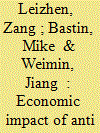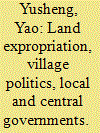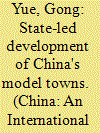|
|
|
Sort Order |
|
|
|
Items / Page
|
|
|
|
|
|
|
| Srl | Item |
| 1 |
ID:
163123


|
|
|
|
|
| Summary/Abstract |
This article examines a particular data set on China's statements in the United Nations (UN) on human rights issues that has heretofore not received attention. As this data set is from the Chinese government's own selection, and not from the UN's repository, it reflects the Chinese government's position on human rights that it aims to advance. The author's review reveals that while the Chinese government strives to shield governments of developing countries with respect to human rights abuses, it has consistently criticised the governments of developed countries about human rights issues. To better understand China's strong support for developing countries, this article examines China's support for Myanmar, North Korea and Sri Lanka as case studies. The Chinese government has selectively—not consistently—opposed country-specific human rights criticism. Based on the prevailing pattern, the author addresses the implications for the future of global governance and of China's actions in international politics pertaining to human rights.
|
|
|
|
|
|
|
|
|
|
|
|
|
|
|
|
| 2 |
ID:
163120


|
|
|
|
|
| Summary/Abstract |
Corruption plagues both developed and developing countries. It is a serious obstacle to China's development that is too perilous to ignore. However, conducting research on corruption, which is characterised as being the most secretive type of behaviour, is particularly difficult. Applying the vector autoregressive model (VAR) to consecutive 36-month data, the authors analyse empirically the corruption status quo and its impact in China. The authors discover short-term negative impacts of the current anti-corruption campaign in China on the economic growth of its state-owned industries, while any positive effects, e.g. improved quality of economic growth, cannot be demonstrated. The objective data used reduce significantly the confusion surrounding traditional (anti-)corruption studies, which have relied heavily on survey data or subjective evaluation.
|
|
|
|
|
|
|
|
|
|
|
|
|
|
|
|
| 3 |
ID:
163117


|
|
|
|
|
| Summary/Abstract |
This study examines the political development in a well-off, industrialised village of Zhejiang province from 1996 to 2015. It illustrates how urbanisation impacted village politics: the rise in the village's land values, the entrance of outside players to village politics and how the villagers' demands to participate in land expropriation posed an unprecedented challenge to the village leadership and the fledgling democracy. The village's increasing resources also drew the village's economic elite into intense electoral competition. The three elections in which they offered bribes undermined the quality of the elections and governance, as well as villagers' political rights and economic interests. In addition to the village leaders and economic elite, this study identifies the local governments, particularly the town government, as being responsible for the deterioration of the village's elections and governance. While holding the central government accountable for local governments' abuse of "land finance", this study also found that the central government played a positive role in improving village's elections and governance.
|
|
|
|
|
|
|
|
|
|
|
|
|
|
|
|
| 4 |
ID:
163122


|
|
|
|
|
| Summary/Abstract |
This article applies neo-functionalist models to explain the process of integration between China and its Special Administrative Region, Hong Kong. Neo-functionalist models are often used to analyse the configuration of regional institutions, in particular European integration. An overview of the model that examines the process mechanisms and factors that have integrative potential can better facilitate our comprehension of the deepening integration of the Chinese and Hong Kong systems, as well as some of the challenges and resistance faced by supporters of integration. This article conveys theoretical and practical implications for China–Hong Kong interactions, the future of the "one country, two systems" principle, and the potential integration of the Greater China region. It also attempts to explain the within-country integration, thereby extending and enriching the neo-functionalist literature.
|
|
|
|
|
|
|
|
|
|
|
|
|
|
|
|
| 5 |
ID:
163116


|
|
|
|
|
| Summary/Abstract |
What explains the formation and division of conflict groups? What mechanisms shape the content and direction of factional alliances? This article addresses these questions by re-examining the factional politics and contentious conflicts in Guangzhou in 1967. It has long been recognised that during the Cultural Revolution there was a clear division between factions labelled as "conservative" and "radical", with the former comprised of groups that were relatively favourable to the status quo of Party authority and the latter composed of groups that were opposed to the existing rule. This interpretation, however, cannot withstand scrutiny at close range in light of the more extensive evidence available today. Focusing on the prominent case of Guangzhou, this article argues that the positions of both factions were interactive and strategic in nature. Their rivalry developed as a result of tactical manoeuvres and an ever-shifting set of interactions among local rebels, military authorities and political actors in Beijing, rather than any preexistence of rivalry or ideological differences. The discussion of the implications of a more dynamic interpretation of factional conflicts during the Cultural Revolution enhances our understanding of the contentious politics in Maoist China.
|
|
|
|
|
|
|
|
|
|
|
|
|
|
|
|
| 6 |
ID:
163118


|
|
|
|
|
| Summary/Abstract |
Public interest litigation has been considered a major legal breakthrough in China in promoting environmental law enforcement and the court-centred environmental movement. This article, however, reveals a huge gap between expectation and reality. Old legal and political obstacles against access to justice to protect individual rights also have a negative impact on the effectiveness of public interest litigation in practice. The design of the procedure is also problematic. Targeting polluters directly, civil public interest litigation diverts public attention from government accountability. The courts and procuratorates are overburdened with responsibilities that should be taken by administrative authorities. NGOs are not allowed to bring public interest litigation against administrative authorities and unnecessarily stringent standing requirements further restrict opportunities for NGOs to sue. Seeking monetary compensation through this procedure is an unstable and unpredictable approach to secure environmental restoration expenses. On the whole, this procedure has created more problems than it has solved.
|
|
|
|
|
|
|
|
|
|
|
|
|
|
|
|
| 7 |
ID:
163121


|
|
|
|
|
| Summary/Abstract |
This study unpacks the roles of local cultural repertoires and media systems in glocalising the social movement discourse on anti-genetically modified crops in China. The discourse analysis not only demonstrates how residual Maoism legacies are used to produce Mao-style movement discourses, but also reveals how the resulting ideological disjuncture has led the post-socialist media system to criticise, tailor or activate the Maoist movement discourse. This project calls attention to the impact of socialist legacies on shaping social movement discourses in post-socialist China. It also invites us to reflect on the perspective of "essential diffusionism" pervasive in the movement diffusion literature.
|
|
|
|
|
|
|
|
|
|
|
|
|
|
|
|
| 8 |
ID:
163119


|
|
|
|
|
| Summary/Abstract |
Town development significantly drove China's rural industrialisation and urbanisation forward during the 1980s and 1990s. This article examines the state-led development of model towns since the early 2000s. A case study of Guangdong province demonstrates that all levels of the government administration system have been involved in the establishment of model towns, forming a state-led development framework from "above". As is evident in the state-led framework, prefectural and county governments control the development even though the central and provincial governments have established major development programmes and organised local governments to implement them. Government interactions have therefore resulted in diverse development paths with varying effects among regions. While state-led development has involved industrialists as a crucial force, it has largely excluded forces from "below", such as village collectives and rural migrants.
|
|
|
|
|
|
|
|
|
|
|
|
|
|
|
|
|
|
|
|
|